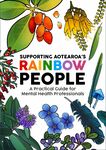-
MVIP AGENCY DIRECTORY
-
CHILDRENS TEAM
<
>
MVIP AGENCY DIRECTORY
| Champion Directory V6.pdf | |
| File Size: | 2234 kb |
| File Type: | |
Your browser does not support viewing this document. Click here to download the document.
RESOURCES
To report or not to report?
That is the question!
Katherine Hall Emma Donaldson Martyn Williamson
Journal of Primary Health Care 9(4) 244-247 https://doi.org/10.1071/HC16064
Published: 5 September 2017
In New Zealand general practices, we come across adolescents who are sexually active. It is quite clear in New Zealand law that everyone (including minors) who has sexual connection with a young person below the age of 16 years is potentially liable for prosecution and imprisonment.1,2 In the UK, there is mandatory reporting of all sexually active children aged 13 years or less.3,4 Many people feel that every instance of under-age intercourse should be reported to the police; however, mandatory reporting can be counter-productive.3 It reduces attendance of adolescents at sexual health and family planning services, so children who may be at most risk may not present and thus not be identified.3,5 Mandatory reporting can criminalise essentially good people involved in consensual relationship, the harm of this being not insignificant to the individuals, their families, and the wider community, and could potentially overwhelm police and social services resources.6
One pragmatic approach for dealing with cases of sexually active minors is to assess each case individually for signs of abuse, and consider the context of the child’s overall life (eg are there signs of other risk-taking behaviour, intellectual impairment or vulnerability?). This approach makes it an ethical, not a legal decision to report sexually active adolescents to authorities.
If we accept that this is an ethical rather than a legal decision, we then need to know how ethics can be useful in deciding whether this was an abusive relationship, and if it is in the adolescent’s best interest to report this to the police, because as this case shows, the two decisions may not, ethically speaking, be one and the same.
Read the Full Article HERE
That is the question!
Katherine Hall Emma Donaldson Martyn Williamson
Journal of Primary Health Care 9(4) 244-247 https://doi.org/10.1071/HC16064
Published: 5 September 2017
In New Zealand general practices, we come across adolescents who are sexually active. It is quite clear in New Zealand law that everyone (including minors) who has sexual connection with a young person below the age of 16 years is potentially liable for prosecution and imprisonment.1,2 In the UK, there is mandatory reporting of all sexually active children aged 13 years or less.3,4 Many people feel that every instance of under-age intercourse should be reported to the police; however, mandatory reporting can be counter-productive.3 It reduces attendance of adolescents at sexual health and family planning services, so children who may be at most risk may not present and thus not be identified.3,5 Mandatory reporting can criminalise essentially good people involved in consensual relationship, the harm of this being not insignificant to the individuals, their families, and the wider community, and could potentially overwhelm police and social services resources.6
One pragmatic approach for dealing with cases of sexually active minors is to assess each case individually for signs of abuse, and consider the context of the child’s overall life (eg are there signs of other risk-taking behaviour, intellectual impairment or vulnerability?). This approach makes it an ethical, not a legal decision to report sexually active adolescents to authorities.
If we accept that this is an ethical rather than a legal decision, we then need to know how ethics can be useful in deciding whether this was an abusive relationship, and if it is in the adolescent’s best interest to report this to the police, because as this case shows, the two decisions may not, ethically speaking, be one and the same.
Read the Full Article HERE

Supporting Aotearoa's rainbow people : a practical guide for mental health professionals
This guide is for anyone who provides mental health support in Aotearoa, including (but not limited to) counsellors, psychologists, psychiatrists, psychotherapists, tohunga (Māori healers), social workers, mental health nurses, and GPs. It will also be helpful for youth workers, group facilitators, and peer supporters. Get the Guide HERE Visit the Website HERE |


